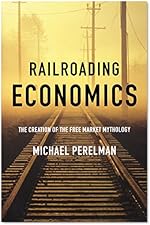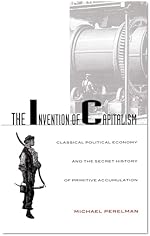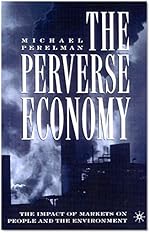The Perverse Imbalances between Town and Country
I am writing this paper for a seminar I will give at Yale. Any comments would be appreciated. It still needs work.
I am writing this paper for a seminar I will give at Yale. Any comments would be appreciated. It still needs work.
 25 – The Confiscation of American Prosperity: From Right-Wing Extremism and Economic Ideology to the Next Great Depression
25 – The Confiscation of American Prosperity: From Right-Wing Extremism and Economic Ideology to the Next Great Depression 30 – Manufacturing Discontent: The Trap of Individualism in Corporate Society
30 – Manufacturing Discontent: The Trap of Individualism in Corporate Society Class Warfare in the Information Age
Class Warfare in the Information Age Railroading Economics: The Creation of the Free Market Mythology
Railroading Economics: The Creation of the Free Market Mythology Steal This Idea: Intellectual Property Rights and the Corporate Confiscation of Creativity
Steal This Idea: Intellectual Property Rights and the Corporate Confiscation of Creativity The Invention of Capitalism: Classical Political Economy and the Secret History of Primitive Accumulation
The Invention of Capitalism: Classical Political Economy and the Secret History of Primitive Accumulation The Perverse Economy: The Impact of Markets on People and the Environment
The Perverse Economy: The Impact of Markets on People and the EnvironmentBlog at WordPress.com.WPzone.net.
Hi, Michael,
I like the first 25 pages.
One more item for you on Rome vs. the countryside. In The World of Late Antiquity (I’m missing the page #), Peter Brown quotes Galen (but I don’t think Brown gives the source), who was writing about famine in the countryside:
‘The city dwellers, as was their practice, collected and stored enough corn for all the coming year immediately after the harvest. They carried off all the wheat, the barley, the beans and the lentils and left what remained to the country folk.’
On social capital: Routledge & Von Amsberg (J Monetary Econnomics 50 (2003)) cite Putnam’s Bowling Alone (2000, p. 443) for a use of ‘social capital’ that came long before Jacobs’:
The term ‘‘social capital’’ was coined by L.J. Hanifan, a social reformer, who in
1916 chose the word ‘‘capital’’ specifically to highlight the importance of the social
structure to people with a business and economics perspective.
Jacobs’ dismissive view of the countryside & the poor is also vivid in her Cities and the Wealth of Nations, in which she declares that if Bombay were independent of India, it would be Singapore (if memory serves, and it’s been a while, she counted this as a good point for cities, not a reflection of the interdependence of city and countryside and Singapore’s providential separation from the countryside that feeds & fuels it).
From p. 26 onwards, you lose me. So much on the comings & goings of Marx & Engels’ views of city & country, industry & cotton: what are we learning from this?
Fred
I am very grateful for these comments. Thank you very much.
[…] on text below to read:The Perverse Imbalances between Town and Country […]